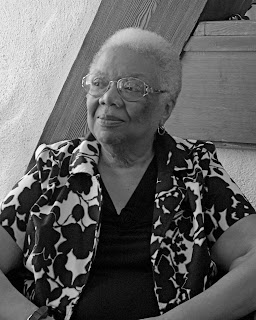
Poet Lucille Clifton died last Saturday February 13, 2010 at age 73. She was born in 1936 to a working class family in Depew, New York. She published her first book at age 33, after poet Robert Hayden entered her poems in the 1969 YW-YMCA Poetry Center Discovery Award. She worked in state and federal government jobs until she got her first teaching position as writer-in-residence at Coppin State College in Baltimore, Maryland in 1971. She was mother to six children and married to artist and philiosphy professor Fred Clifton, who died in 1984.
First, a poem.
The Death of Fred Clifton
11/10/84
Age 49
I seemed to be drawn
to the center of myself
leaving the edges of me
in the hands of my wife
and I saw with the most amazing
clarity
so that I had not eyes but
sight,
and, rising and turning,
through my skin,
there was all around not the
shapes of things
but oh, at last, the things
themselves.
~ Lucille Clifton
And another:
i am accused of tending to the past
i am accused of tending to the past
as if i made it,
as if i sculpted it
with my own hands. i did not.
this past was waiting for me
when i came,
a monstrous unnamed baby,
and i with my mother’s itch
took it to breast
and named it
History.
she is more human now,
learning languages everyday,
remembering faces, names and dates.
when she is strong enough to travel
on her own, beware, she will.
~ Lucille Clifton
I worked with Lucille during the summers at the Community of Writers in Squaw Valley where she'd been a staff poet since 1991. At the poetry workshop, she wrote new poems each day along with the other staff poets and participants. Lucille composed her daily poems on a typewriter, working on one of Oakley Hall’s shabby IBM Selectrics. It was my job to collect everyone's first drafts early in the morning and make copies on the wheezing xerox machine. I'd wait for the copies to emerge, standing there, reading the poems, the warm stack of thin white paper. Lucille's drafts were elegant, powerful, spare - and often many would appear a year or two later in magazines and journals, collected eventually in one of her books.
I still remember her final poem from two years ago, how it achieved what Lucille’s work did so well – three spare lines that captured the spirit of the previous night’s party at the Hall House, the week itself – and much more. That poem, the last, as it turned out, that I'd see from her, went something like this:
over the mountains
and under the stars it is
one hell of a ride
~
Lucille's bio is impressive - 11 poetry books, 20 children's books, a host of honors: three time nominee for the Pulitzer, National Book Award winner, poet laureate of Maryland for 11 years and just this year, the Frost Medal from the Poetry Society of America to honor "distinguished lifetime service to poetry."
From the Poetry Foundation:
...Awarding the prestigious Ruth Lily Poetry Prize to Clifton in 2007, the judges remarked that “One always feels the looming humaneness around Lucille Clifton’s poems—it is a moral quality that some poets have and some don’t.”
...Speaking to Michael S. Glaser during an interview for the Antioch Review, Clifton reflected that she continues to write, because "writing is a way of continuing to hope ... perhaps for me it is a way of remembering I am not alone." How would Clifton like to be remembered? "I would like to be seen as a woman whose roots go back to Africa, who tried to honor being human. My inclination is to try to help."
One more poem, though there are so many, about so much:
mulberry fields
they thought the field was wasting
and so they gathered the marker rocks and stones and
piled them into a barn they say that the rocks were shaped
some of them scratched with triangles and other forms they
must have been trying to invent some new language they say
the rocks went to build that wall there guarding the manor and
some few were used for the state house
crops refused to grow
i say the stones marked an old tongue and it was called eternity
and pointed toward the river i say that after that collection
no pillow in the big house dreamed i say that somewhere under
here moulders one called alice whose great grandson is old now
too and refuses to talk about slavery i say that at the
masters table only one plate is set for supper i say no seed
can flourish on this ground once planted then forsaken wild
berries warm a field of bones
bloom how you must i say
~Lucille Clifton
She said it.

(photo: Lucille Clifton receives the National Book Award in 2000.)
UPDATE: To read the New York Times obituary, click here.




2 comments:
Sympathies on losing a friend, and to all of us, in losing a voice.
Thanks for introducing me to this poet. I really enjoy these poems.
Oh history. Some of us tried to ignore you. It didn't work out so well.
Post a Comment